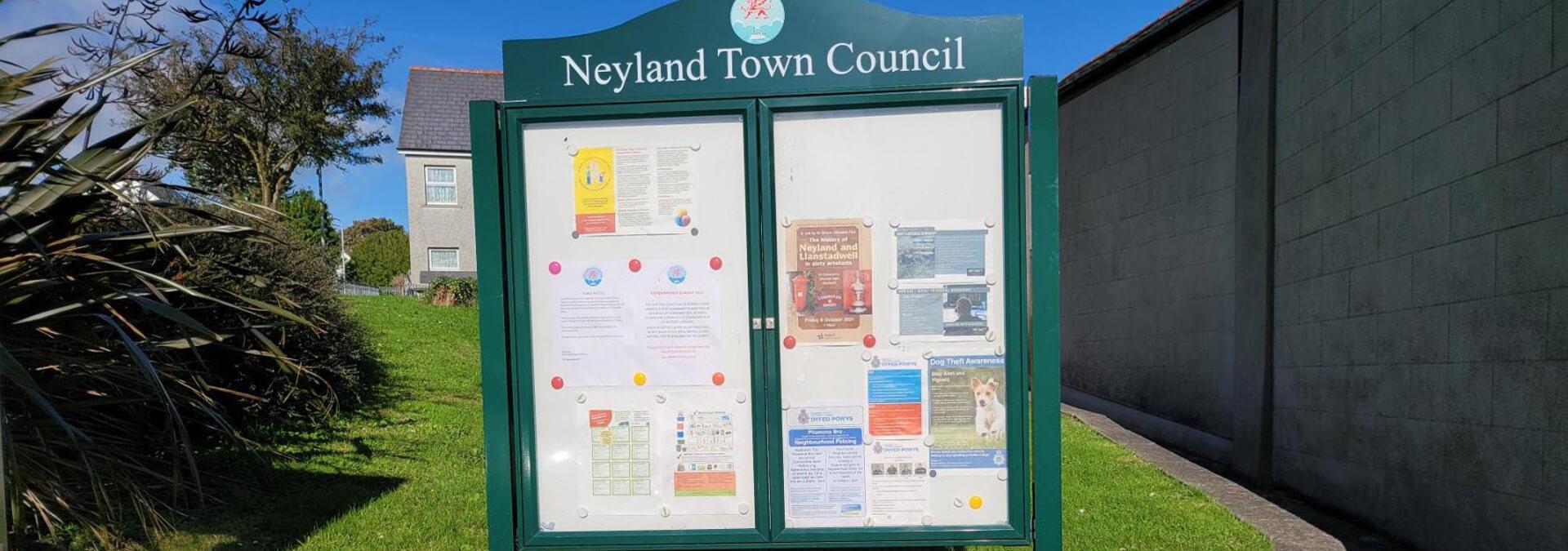News
Neyland Councillor storms out of town council meeting amidst vote of no confidence

IN A STUNNING turn of events, a Neyland councillor has dramatically stormed out of the monthly town council meeting following a contentious vote of no confidence, which he believes is completely at odds with the prevailing sentiment of his town’s inhabitants.
Councillor Peter Hay, a respected figure who has dutifully served on the town council for the past seven years, found himself at the center of a storm during the June meeting. A vote of no confidence was unexpectedly passed against him and three other councillors after allegations surfaced regarding secretive gatherings.
Expressing his dismay, Councillor Hay voiced his concerns to the local media stating, “That decision was utterly incongruous with the prevailing sentiment of the Neyland community, as per my interactions with its members. My name has been unjustly tarnished as a result of these accusations, and the electorate is now questioning my integrity. It’s truly disheartening.”
Clearly frustrated, Councillor Hay continued, “It appears that certain councillors are exploiting their positions within the town council to further their personal political agendas, and this is wholly unacceptable. It was due to these circumstances that I felt compelled to withdraw from Monday’s meeting.”
Councillor Hay remains uncertain about his future attendance at upcoming meetings, stating, “Naturally, I would like to see the vote of no confidence revoked, but more importantly, I long for the resolution of all these issues. The people of Neyland are growing weary of incessant squabbles month after month. I became a councillor to contribute to my town, as it is truly deserving of my dedication.”
Having diligently served on the town council for the past seven years, Councillor Hay has gone above and beyond his obligations, immersing himself in practical tasks and engaging in vigorous debates within the council chamber.
Councillor Hay reflected on his additional endeavors, noting, “Engaging in practical work is not an obligatory duty of a councillor. However, being a retired engineer, I possess the necessary skills, and moreover, I genuinely want to make a difference.”
This week’s town council meeting unraveled with members embroiled in a heated 90-minute dispute over the accuracy of the minutes from the previous month’s gathering. The proceedings took place on Zoom, with members of the public in attendance. One such attendee, identifying themselves as ‘a Neyland resident,’ expressed their exasperation in the chat, remarking, “Sarcasm, personal attacks… what a load of rubbish.”
The future of the Neyland town council hangs in the balance as divisions within its ranks persist, leaving its constituents longing for a return to harmony and a cessation of relentless turmoil.
News
Welsh pensioners to receive state pension increase amidst mixed reactions

STARTING this month, over 600,000 pensioners across Wales will see their State Pensions rise by up to £470 annually, following the UK Government’s adherence to the ‘triple lock’ policy. This policy ensures that pensions increase each year by the highest of average earnings growth, inflation, or a minimum of 2.5%.
Government’s Position
The UK Government has emphasized its commitment to supporting pensioners through the triple lock. In a recent statement, it was noted that this commitment would result in the State Pension increasing by up to £1,900 over the course of the current Parliament.
Opposition and Think Tank Critiques
However, the policy has faced criticism from various quarters. The Liberal Democrats have raised concerns about the real impact of the pension increase, pointing out that due to the freezing of income tax thresholds, a significant portion of the pension rise could be offset by increased tax liabilities. They estimate that a typical basic rate tax-paying pensioner might see 77% of the pension increase negated by these tax measures.
Additionally, the Institute for Fiscal Studies (IFS) has questioned the sustainability of the triple lock mechanism. They argue that while the policy aims to protect pensioners’ incomes, it may not be the most efficient approach and could lead to unpredictable fiscal burdens.
Pensions Minister’s Stance
Torsten Bell, the newly appointed Pensions Minister, has previously described the triple lock as “rubbish” and advocated for its replacement with a system that aligns state pension increases with benefits for jobseekers and the long-term sick. Despite his past remarks, recent reports indicate that he is now “fully committed” to maintaining the triple lock.
Economic Implications
Financial experts have also highlighted potential unintended consequences of the pension increase. The freezing of personal tax allowances means that some pensioners may find themselves pushed into higher tax brackets, thereby reducing the net benefit of the pension rise. This situation underscores the complex interplay between pension policies and tax regulations.
In summary, while the increase in State Pensions is a welcome development for many Welsh pensioners, it has sparked a broader debate about the effectiveness and sustainability of the triple lock policy, as well as its interaction with the broader tax system.
Crime
Over 120 Carmarthenshire people identified as ‘money mules’ in fraud probe

More than 120 people in Carmarthenshire, mostly living in the Llanelli area have handed over their personal bank details to criminals involved in money laundering in exchange for financial gifts.
Economic Crime Team officers from Dyfed-Powys Police identified the individuals as part of an ongoing criminal investigation and issued notices advising them to stop the activity immediately or face prosecution.
Throughout February, the team visited people who had been linked with a suspected fraudster, as part of Operation Henhouse – a month-long nationwide clampdown on fraud offences.
On speaking to those involved, officers learned how the individuals opened online bank accounts using their personal information and identification and gave their account login details to criminals in return for cash, who then used their bank accounts to launder money obtained through crime.
The team offered safeguarding advice and warned them about the dangers of opening bank accounts to be used by someone else for criminal activity.
Many were unaware of the implications of what they had done and thought it was an easy way to make some money. Some were given financial gifts ranging from £50 to £200, while others were promised money but did not receive it.
Dyfed-Powys Police Fraud Investigator Sian Stevens said: “Through intelligence, we were made aware of a fraudster who recruited a number of people in the Llanelli area to open bank accounts, which were then subsequently used for money laundering purposes.
“The Economic Crime Team visited over 120 individuals in February to explain that they had been used as a money mule – this is someone, who has allowed their bank account to be used to send criminal money. We issued them with cease and desist notice to interrupt any further fraud by making sure they were aware what they were doing was a criminal activity.
“Many of the people were linked to each other. Some were family members or in the same friendship groups, ranging from young adults to pensioners. The accounts had been opened as a direct or indirect interaction with the fraudster.
“For example, there were some instances where an individual opened a bank account after contact with the fraudster and then went on to tell their friends, ‘you can earn £50 if you open up a bank account and give the details to this person’ and so on. That was just one of many examples how the fraudster managed to obtain personal bank details.”
Dyfed-Powys Police Economic Crime Team Manager Paul Callard said: “People fall victim to fraud every day and the impact on victims can be devastating, both financially and emotionally.
“They can be taken advantage of by criminals and encouraged to allow their accounts to be used. People should be very careful about who they provide their personal information to.
“We will not tolerate fraudulent activity and will look to tackle criminals at every opportunity.”
How to avoid becoming a victim of fraud
- Always use the ABC of scam awareness. Never Assume or Believe a caller, email or text is genuine. Always Confirm by contacting a trusted relative, friend, your bank’s fraud department or the police to check it is genuine.
- Remember the police will never call you asking you to assist with an investigation by withdrawing cash for them to collect, or requesting to collect your bank card. If you receive a call purporting to be from the police and are unsure it is genuine, ring them back via 101 using a different telephone.
- Avoid clicking on links in emails and text messages from unknown sources, as they are liable to be a scam.
- Always use a strong and separate password for your email address by using three random words.
Do you know what will happen if you are caught allowing criminals to use your bank accounts to money launder?




Community
Pembrokeshire projects are building success

PEMBROKESHIRE County Council’s Building Control Team is congratulating local building and design projects for success in the LABC Building Excellence Awards 2024.
The LABC Building Excellence Awards are the largest business to business awards in the building control sector.
They celebrate buildings and design teams that have overcome the challenges of complex technical and construction issues and put the spotlight on innovative and creative building work.

In Pembrokeshire, D & O Construction Ltd, Julian Bishop Architect, Redstone Architecture and AB Rogers & Son Ltd, Hayston Development & Planning Ltd all achieved success on some high profile local projects.
In the Regional LABC Building Excellence Awards 2024, Berry Lodge, Newport won the Best Residential Extension in Wales prize with work carried out by D & O Construction Ltd and with agents Julian Bishop Architect and Redstone Architecture.
Highly Commended was the development at Plas Y Castell, Llawhaden, carried out by AB Rogers & Son Ltd and Hayston Development & Planning Ltd.
The Berry Lodge development then went forward to the Grand Finals at Grovesnor House in London where the top projects across the UK were celebrated.

Council Building Control Manager Sam Goodwin said: “Building Control is delighted to work on these projects which highlight the skill and innovation of developers locally.
“Pembrokeshire County Council Building Control is proud to be part of LABC Awards. The Local Authority Building Control (LABC) awards were set up to celebrate excellence achieved through high building standards, technical innovation and sustainable designs.
“The Awards are an opportunity for the industry to celebrate good building practice and winners demonstrate how positive working relationships with local Council building control teams achieve high quality, sustainable buildings.
“The awards are unique because they recognise how this cooperation improves building standards and professionalism across the industry and it is great to see local contractors, agents and designers within Pembrokeshire receive recognition in achieving these standards.”
If you would like to contact Building Control at Pembrokeshire County Council, please contact Building Control via the website www.pembrokeshire.gov.uk/building-control or alternatively contact 01437 764551
-

 Business5 days ago
Business5 days agoSpaceX eyes Milford Haven for new UK facility
-

 Crime6 days ago
Crime6 days agoPembrokeshire farm worker accused of threatening to burn employer’s farm
-

 Crime5 days ago
Crime5 days ago‘Yeah but no but’ insult to female officer lands Monkton man with court fine
-

 Crime7 days ago
Crime7 days agoPembrokeshire beach dog ban enforcement changes expected
-

 Features5 days ago
Features5 days ago‘We weren’t wild. We were unprotected’: A generation groomed and forgotten
-

 Crime5 days ago
Crime5 days agoLeaked messages reveal shocking culture at HMP Parc amid misconduct probe
-

 Community7 days ago
Community7 days agoSpectacular evening of music at Ysgol Greenhill
-

 Politics6 days ago
Politics6 days agoProbe into ‘escalating’ horse fly-grazing in Pembrokeshire






























